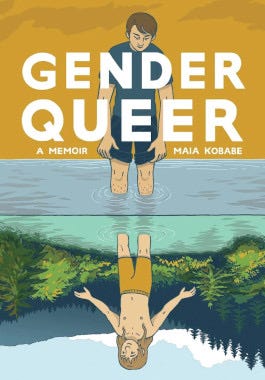Fascism is a strong word. Powerful. Dangerous.
Wield it carefully, the right say, as they defend their politicians from nazi-like behaviour and participate in the dismantling of their own constitutional protections. If you throw it around at just anyone, they say, it weakens it. Fascism doesn’t mean anything when you use it like that. It’s like comparing someone to Hitler to win an argument on the internet, something recognised as a sign that a discourse has devolved beyond saving.
A convenient argument to have on hand, really, when the far-right president-elect of the United States openly admires Hitler and even instructed his right hand man that his people should be more like Nazi generals the last time he was in power.
That John Kelly turned against his party to campaign against Donald Trump on principles of protecting democracy and opposing Naziism based off behaviour like this is surely a sign of how serious and credible this genuinely fascist threat is.
Over here in little old New Zealand, meanwhile, we are beginning to receive some quite clear signals of our own.
It seems a struggle for some to grasp that fascism in the 21st century, in this post-war world constructed around globalism, neoliberalism, and the internet, might look just a bit different did than it did in 1940.
But a one-to-one match is not needed to identify and respond to elements of fascism in our politics; it is our duty to call it out and stand against it whenever and wherever we see it.
The left understands this, and hold it as a key value underpinning their movement, and will turf (terf) it out from their communities where they see it. This is in fact what happened with radical feminism, where activists transformed their desire to uplift themselves into a desire to put down and suppress others, being so riled by their own rage at men (and the rest of feminism for refusing to call trans women that) that they entirely shifted their concerns from the liberation of women to the removal of trans women from leftist and women’s spaces, and later on as their ideas devolved, from society entirely. It is just one feature of a staunch intolerance for authoritarianism and domination within the left that results in the modern far left devolving into not fascism, as has been the fear for the last century, but into anarchism, into campaigning for the eradication of the state entirely.
Fascism as we know it presently is exclusively the domain of the right, where no such resistance to these ideas occur — in fact, it has not been until the last few years that we’ve seen very much pushback from the moderate right at all, and it has come far too late.
The flames they have stoked are well and truly licking at our feet.
Book burnings have left us with a terrible impression of what fascism and naziism and the control of information by the state is. If the Nazis had never burned a single book, they wouldn’t be any less fascist, any less successful, and they still would still have had the control of information throughout Germany and their occupied territories at nearly every single point in their campaign.
But it makes for a great photo. Such a visceral image — cartoonishly evil people burning the universal symbol of knowledge that we’ve revered as holy ever since we invented the printing press and immediately used it to distribute the Word of God.
It affixes in people’s minds as their concept of what suppression is, what censorship is, and like the gas chambers, becomes total the sum of the evil Nazis committed against their people and against others; given enough time and ignorance and disinterest, it becomes the only known element of their control and genocide.
In a world where information is recorded and preserved online, this symbolism is significantly outdated. But the oversimplification predates even this; it has been wrong, misleading, a clickbait con used for attention, ever since people first began spreading word of the horrors of World War II.
People are rightly horrified by the idea of book burnings. But this emotive response distracts from the realities of the regime and why it was so effective.
It disguises that Hitler and the Nazi party cemented most of their control over information, not through book burnings, but via the seizure of information at its source. When the Nazi Party came to power in 1933, Hitler already controlled 3% of the nation’s newspapers.
Book burnings, this vague generalised bonfire of books, directs attention away from the specific targets and purpose the Nazis had; to destroy ideas in works written by Jewish authors and new scientific knowledge of homosexuality and transgenderism from the Institute of Sex Research. And of course “foreign” authors who also presented ideas that challenged Nazi beliefs.
And as an overall effect, it creates the idea that the crime here was the destruction of books, rather than acknowledgement that it was a campaign to eliminate ideas and writings and science around minority groups in that society.
Nowadays, people are too wary for book burnings to be an effective means of censorship and propaganda (though owning the press still works wonderfully). If you want to control information, you’d have to do something much more subtle these days, like luring people into relying on algorithms that provide imperfect information to everyone instead of us all just searching the world’s most reliable encyclopedia. Or by taking control of as much of social media as possible, where democratic conversation now happens.
Or by defunding writers you disagree with, perhaps.
Seymour must have felt so smart when he realised he’d landed on a recipe for censorship that would be acceptable to and play well for his wealthy followers who already disapprove of public spending. No need to mention the word ‘ban’, only that it depicts violence(towards white people, so we can call that racism) and emphasise the public money that funded it. No one is getting deplatformed or silenced.
Only the entire field of literature, of course.
This method of “challenging ideas” threatens concepts at their source: in the mind of the writer, of all writers, warning them against using uncomfortableness as a tool and from being too direct or confronting in their handling of challenging issues. It signals specifically to skirt themes of colonialism, and it interferes with the independence of the literature and arts industry.
I don’t know if you’re aware, but writing, especially poetry, isn’t typically a very lucrative job. Those who do it as a profession often rely on grants, awards, residencies, etc to sustain themselves, their families, and their careers. The implication that could have been intended here, or could be taken by the arts industry regardless of what was meant, is that David Seymour Disapproves, and he has a say in where the money goes, and he directs government policy around and how it is funded, so maybe have a think about that when you’re picking your next Poet Laureate.
This is his intention, in my opinion, but it’s not his main aim — his aim is to signal outrage to his supporters, and to all the people who watch him on the news or catch a sound bite on the radio and think about how reasonable he sounds when he says “Is this really how we want to talk about these ideas in New Zealand?”
Censorship of left wing works is a staple of the far right modus operandi, and America has it down to an art.
Even just these works being accessible to innocent and morally pure children is enough to rile up conservatives, inciting all sorts of moral panic about sex, violence and witchcraft being shown to their precious little ones. They then set about their local libraries and schools with fervour, seeking to protect people from these dangerous ideas.
The list of banned books in America is so titillatingly long and full of mainstream books that there’s a whole shop dedicated to selling titles that have been removed from public libraries, and it makes for wonderfully eye-catching promotional displays in libraries and shops. This anti-censorship demonstration is powerful, a form of protest, and is especially effective at showing the ridiculousness when displaying the more banal titles that have been revoked. But the theatrics do still detract from the overwhelming obvious reality that the books most often targeted are not classic mostly-uncontroversial children’s stories like Harry Potter and Alice in Wonderland, but are serious works that circulate around queer identity, racism, and sex.
This list ranking the 50 most banned books shows this quite starkly.
Of course, we live in New Zealand, and a pretend-libertarian like David Seymour can’t very go around telling people to get a bunch of books banned from libraries. It might give the game up. He’s is far more cunning than that.
Instead, he picks an angle that plays very well to his anti-government, less-taxes-please crowd with “We just shouldn’t fund this”, playing the ever-popular reverse-racism card and claiming supposed amorality of the content depicted is a huge issue.
Government funding of the arts is what allows many creatives in Aotearoa to create, and it specifically makes the field more egalitarian and stronger for it. If you don’t pay your artists and provide pathways for different classes and cultures to practice the arts as both amateurs and professionals, you end up with a bunch of trust fund kids and nepo babies making all your music and writing all your books, because they’re the only ones who can afford to do so. As a result, your art becomes worse because you’ve thinned out your field to favour the kids of the wealthy who have much less diverse experiences and worldviews.
This already happens a lot. A UK study found that people in the creative sector were four times more likely to be from professional families than to have working class roots, despite years of attempts to make the field more open and diverse.
And with fewer film directors, authors or songwriters to describe the experience of growing up in a working-class household, some creatives fear their stories are being squeezed out of culture or confined to “poverty porn”.
“These class imbalances have been with us for a long time,” said Dave O’Brien, a professor of cultural and creative industries at the University of Sheffield and one of the paper’s authors.
“It suggests that we need to do something more than just create access courses. It suggests that this is a big social problem, not just something that the BBC or the Arts Council or these kinds of organisations should be addressing.”
Creative New Zealand is making their own inroads on our class issue in the arts, but it’s a difficult task that requires more money than they have, and is made harder by this government and their policies. When combined with discrepancies in New Zealand that stem from ethnicity, this greatly affects creatives along race lines too and can limit the diversity of cultures and ideas reflected in our media.
New Zealand is the home — the only home — of Maori culture and, excepting Hawaii, we also have arguably the closest ties of any developed nation to the Pacific Islands and the collection of cultures and groups that reside across our vast, shared ocean. Because of this, we recognise that we have the duty and the privilege of promoting Pacific and Maori voices and perspectives, and facilitating the conversations that occur through creative and cultural expression, a conversation that reaches well beyond just New Zealand and our isolated part of the world.
Such a responsibility only makes David Seymour’s targeting of a Pacific poet’s income source all the more disgusting and damaging.
Seymour is all about disrespecting displays of culture as a form of speech — he branded an impromptu school visit haka protesting his presence as “overexcited” and “unhygienic”, and most recently objected to the haka that broke out in Parliament in response to his Treaty Principles bill. So for him to be publicly attacking — on multiple occasions, over a span of months — not just a celebrated Pacifica poet but her funding source, her ability to perform her craft, reflects the level of power he knowingly wields as a speaker in this ‘conversation’.
And his words, too, wield power, something we see in his claims the content is offensive, highlighting the violence and race aspects. Now we are talking as a nation about what it is acceptable for writers to write about — and you should get a say in that, David says. After all, you’re the tax payer! To use Luxon’s terms, you’re the customer! Do you really want this seemingly enormous sum that is a fraction of Seymour’s yearly income going towards literature that discusses violence in a way you don’t like?
If art is a conversation and Tusiata Avia’s poem Savage Coloniser discusses colonialism, Seymour’s entire rebuttal has been, “I don’t want to pay for this”.
Isn’t that such a libertarian way to look at the arts?
I personally don’t want to pay David Seymour’s salary, but I’m a grownup who accepts that even racist pricks need to be paid for our political system to flourish, and so I’ll hold my tongue on the matter. But for some reason Seymour felt he was the guy to weigh in on — to begin — the conversation around what sort of artwork the arts community should be funding and celebrating.
I just read the best description of fascism I’ve ever come across, and I need to share it.
The original post was linking the recent Millenial and Gen Z trend of moralising fictional content with the rising fascism that’s across America and the world.
These trends comes from a range of causes, but a large one is the burden of social responsibility we place onto media (rightly or wrongly) that has grown heavier and heavier for the past few decades. Viewers want their content to be representative, to say the right things, to show the right things. This has all sorts of interesting effects but a pretty major one was the mistaken conflation of the morality of the subject matter with that of the work (or enjoyer of the work) itself.
The trend also correlates with a period of social media companies disallowing or cleaning up porn on their platforms — many (most) forced to by credit card companies and Apple. If websites and apps want downloads and payments, they have to be clean of controversial content.
In reality, this resulted in many situations where trans people were banned from platforms for posting SFW pictures of themselves and queer people were censored for talking about queer topics. Freedom House identifies the treatment of queer content as a major contributor to our 14 successive years of decreasing internet freedom.
It’s not because they hate trans people, they’re just protecting kids. It’s just an algorithm issue and isn’t intended to target anyone (even though it happens to every site, no exception, and hasn’t improved for a decade, even when users campaign for change). It’s not that these ideas shouldn’t exist, just that the taxpayer shouldn’t pay for it.
And it’s not just Seymour.
David Seymour’s party is deeply involved with the Free Speech Union, who exist to sow misinformation and hate and use similar tactics to control conversations and mislead their supporters on issues that drum up outrage. The dog whistles Seymour gives out in sound bites build on work he knows has been done by other speakers, by other political players, and by groups and right-wing interest like Hobson’s Pledge or whichever new front Jordan Williams has set up so he can pretend to speak with the voice of thousands of citizens.
There are other elements of David Seymour and the ACT party that make me believe he is leading them and the country down a route of fascism and persecution. Economically, his free-market focus and libertarian ideals seem opposed to this, but this is largely a veneer too and provides an excuse to hand power and money to corporations who then support his moves for power and give his campaign money in return. His party retained power through backdoor dealings and he has by his own claims been a driving force in the government’s unconstitutional legislative agenda and their unethical and low-level-fascist means of seeing it done.
But my main reason for calling him a fascist is that he is not reacting to the whims of the people. As his words show, and as he readily admits to over the “debate” he claims he has started around the Treaty Principles, David Seymour and the ACT party are not responding the conversation as representatives.
They are driving it.
They are driving it via dogwhistles and racist dogma purely for the power it provides over a politically uninterested and economically unhappy populace. They are seeding their ideas on social media themselves to be picked up by people and the press so they can get into parliament off the controversy and inflame the situation even more. And those ‘ideas‘ they push on the public are racist, regressive, intolerant, dishonest, and prey on people’s prejudices in the hope of blinding them to reason and empathy.
And it’s working.
And this is what creates fascism.














Sapphi an excellent piece, you totally captured the truth of Seymour. And why I feel so utterly repulsed by the guy. How on earth do we counter this vile man and his manipulation of the wider community who are seduced by the dollar over humanity.
He reminds me of a juvenile Smurf strutting around, with that self conscious smirk plastered on his face.